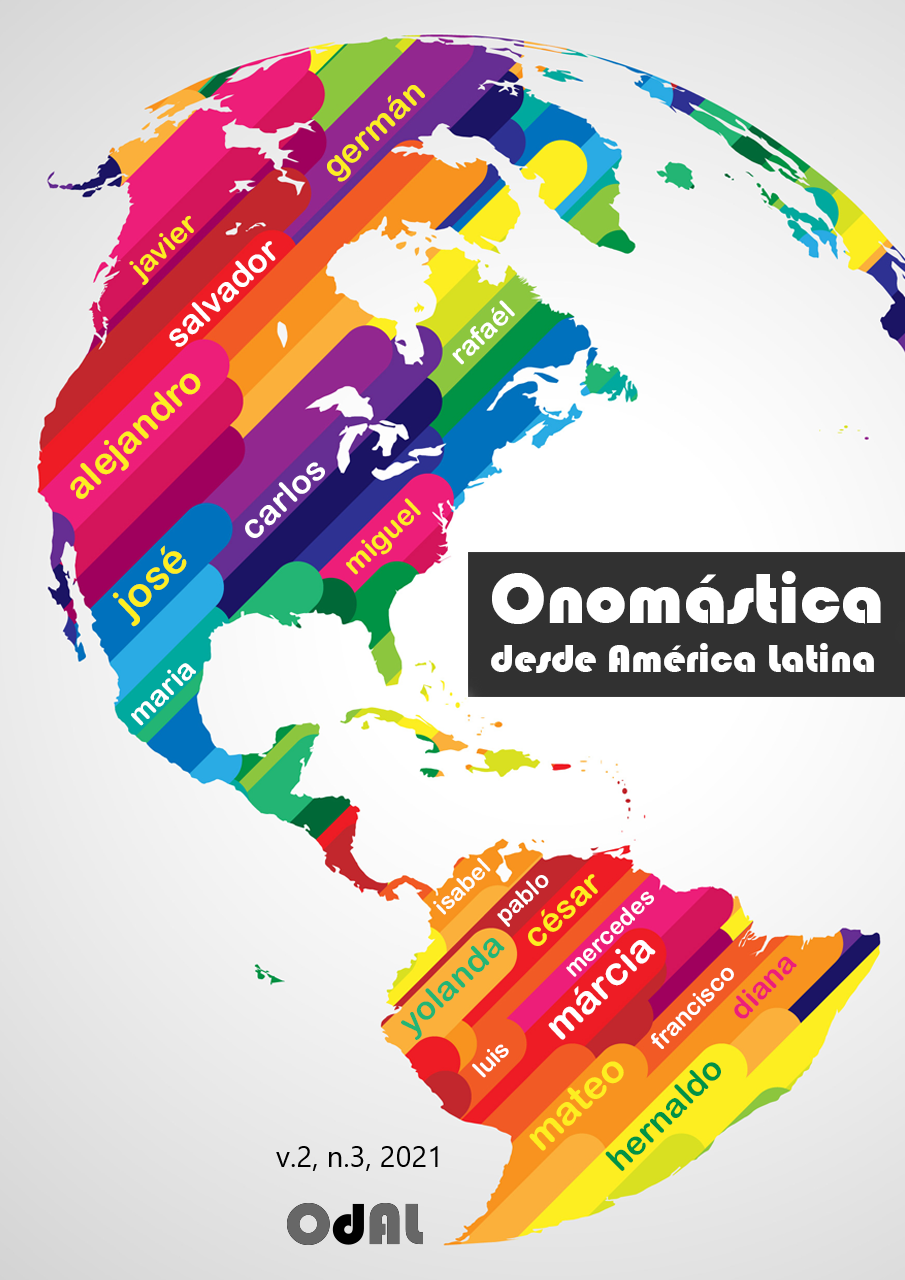Tendências religiosas na antroponímia rondonense
DOI:
https://doi.org/10.48075/odal.v0i0.25725Palavras-chave:
Socioantroponomástica, Motivação religiosa, Nomes justapostos.Resumo
É de sabedoria popular que atribuir nomes religiosos aos filhos pode significar devoção a um santo, personagem bíblico ou crença religiosa particular de uma determinada comunidade. No entanto, ao saber de fato as reais motivações para um determinado antropônimo, a partir de entrevistas com pais ou os próprios portadores do nome próprio, observa-se que nomes religiosos podem evidenciar questões além da simples devoção. Nessa direção, o objetivo deste artigo é analisar, a partir dos estudos da Socioantroponomástica, quais fatores influenciam na prática de nomear um filho com o modelo de atribuição tradicional denominado como a religião (JIMÉNEZ SEGURA, 2014). Para tanto, a pesquisa se utiliza de um corpus formado por 250 nomes justapostos coletados a partir de entrevistas semiestruturadas, em um espaço de tempo que abrange 1930-1940 a 2010, na cidade de Marechal Cândido Rondon, Brasil. A pesquisa aponta que atribuir nomes religiosos pode fazer parte de um ideário de uma determinada comunidade, bem como a nomeação de um filho, através de um nome bíblico, pode evidenciar questões identitárias além do significado restrito do nome (SEIDE, 2016).
Referências
Deitos, N. J. (2007). A igreja católica no Oeste do Paraná e sua atuação no processo de colonização. Migrações e a construção do Oeste do Paraná: século XXI em perspectiva. Cascavel: Coluna do Saber. 183-189.
Dick, M. V. de P. do A. (1992) Toponímia e Antroponímia no Brasil. São Paulo: Coletânea de Estudos. FFLCH.
Guérios, R. F. M. (1981). Dicionário etimológico de nomes e sobrenomes. São Paulo: Ave Maria.
Hall, S. (1992). A Identidade Cultural na pós-modernidade. Rio de Janeiro: DP&.
Jiménez Segura, S. (2016) Los modelos de atribuición del nombre de pila tradicional y a partir de la moda en el municipio de Tlalnepantla de Baz, estado de México. Estudio sincrónico y diacrónico de tres calas: 1930, 1960 y 1990. (Dissertação de Mestrado), Escuela Nacional de Antropología e Historia.
López Franco. Y. G. (2014). Los nombres de pila en la década de 1980 en Montpellier, Francia, y en Tlalnepantla de Baz, México, bajo un enfoque socioantroponímico. In. Isquerdo, A.N.; Dal Corno, G.O.M, As ciências do léxico. Lexicologia, lexicografia, terminologia, Campo Grande: Ed. UFMS.
Pensin, T.G. (2020). Uma revisão ao perfil nomeador dos habitantes de Toledo, Paraná: tradicional ou inovador? Onomástica desde América Latina, n.1, v.1. 199-221.https://doi.org/10.48075/odal.v1i1.24168
Saatkamp, V. (1985). Desafios Lutas e Conquistas: História de Marechal Cândido Rondon. Cascavel: Assoeste.
Seide, M. S. (2016). A identidade religiosa na antroponímia de Marechal Cândido Rondon. Revista Relin, v. 24, n. 1. 167-186.
Seide, M. S. (2018). Moda e tradição na antroponímia. A.N.; Dal Corno, G.O.M, As ciências do léxico. Lexicologia, lexicografia, terminologia Campo Grande: Ed. UFMS. 161 – 178.
Seide, M. S. (2020a). A Antroponomástica Comparada. Onomástica desde América Latina, n.2, v.1. 83-102 https://doi.org/10.48075/odal.v1i2.25488
Seide, M. S. (2020b). Antroponimia, diáspora y migración: los descendientes de lituanos en Brasil. Onomástica desde América Latina, n.1, v.1. 100-121 https://doi.org/10.48075/odal.v1i1.24156
Van Langendonck, W. (2007). Theory and Typology of Proper Names. Berlin/New York: Mouton de Gruyter.
Downloads
Publicado
Como Citar
Edição
Seção
Licença
Copyright (c) 2020 Onomástica desde América Latina

Este trabalho está licenciado sob uma licença Creative Commons Attribution-NonCommercial-ShareAlike 4.0 International License.
Aviso de Direito Autoral Creative Commons
Política para Periódicos de Acesso Livre
Autores que publicam nesta revista concordam com os seguintes termos:
1. Autores mantém os direitos autorais e concedem à revista o direito de primeira publicação, com o trabalho simultaneamente licenciado sob a Licença Creative Commons Attribution que permite o compartilhamento do trabalho com reconhecimento da autoria e publicação inicial nesta revista.
2. Autores têm autorização para assumir contratos adicionais separadamente, para distribuição não-exclusiva da versão do trabalho publicada nesta revista (ex.: publicar em repositório institucional ou como capítulo de livro), com reconhecimento de autoria e publicação inicial nesta revista.
3. Autores têm permissão e são estimulados a publicar e distribuir seu trabalho online (ex.: em repositórios institucionais ou na sua página pessoal) a qualquer ponto antes ou durante o processo editorial, já que isso pode gerar alterações produtivas, bem como aumentar o impacto e a citação do trabalho publicado (Veja O Efeito do Acesso Livre).
Licença Creative Commons
Esta obra está licenciada com uma Licença Creative Commons Atribuição-NãoComercial-CompartilhaIgual 4.0 Internacional, o que permite compartilhar, copiar, distribuir, exibir, reproduzir, a totalidade ou partes desde que não tenha objetivo comercial e sejam citados os autores e a fonte.

